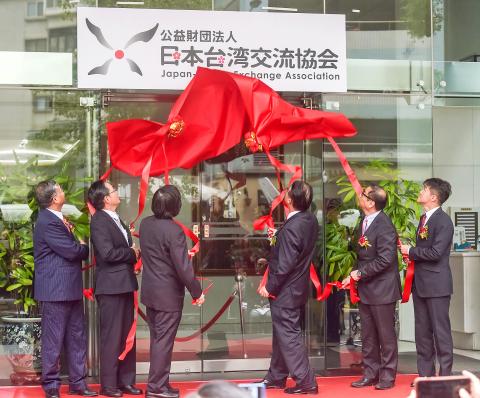Japanese Representative to Taiwan Mikio Numata yesterday said that he hoped Taipei and Tokyo could take their “best relationship” to the next level, as he unveiled the new doorplate for the Japan-Taiwan Exchange Association, which on Sunday changed its name from the Interchange Association, Japan.
In his unveiling ceremony speech, Numata said since the association’s establishment in December 1972, Taiwan and Japan have rapidly “developed a friendly relationship that is rare around the world.”
“At that time, bilateral trade between the two sides only amounted to about US$1 billion, but that climbed to US$57.9 billion in 2015. As for bilateral visits, only 200,000 visitors were recorded in 1972, but in 2015 we saw a record-high 6 million visitors,” Numata said.

Photo: Huang Yao-cheng, Taipei Times
Assistance offered by Taiwanese in the wake of major earthquakes that hit Japan in 2011 and last year has also brought the two nations closer together, Numata said.
The name change came following a survey early last year, which found that only 14 percent of Taiwanese respondents knew about the association, Numata said, adding that he hoped the inclusion of Taiwan in the association’s name would change that.
“The unveiling ceremony also marks a new chapter in the Taiwan-Japan relationship. Let us work together on bilateral ties, which are already at their best in history,” Numata said.
The association represents Japan’s interests in Taiwan in the absence of diplomatic ties, which ended in 1972, when Taiwan set up a quasi-official organization, the Association of East Asian Relations, to handle ties with Japan.
In 1992, the association’s Tokyo office changed its name to the Taipei Economic and Cultural Representative Office in Japan, which serves as Taipei’s de facto embassy in Tokyo.
Association of East Asian Relations president Chiou I-jen (邱義仁) congratulated the Japanese association on its “name change,” which he said took many predecessors tremendous time and effort.
“This outcome carries more than a symbolic meaning and is not just a superficial name change,” Chiou said.
Taiwanese independence groups cheered the name change outside of the ceremony.
“It is another giant step toward correcting our name to ‘Taiwan’ in the international community,” the group 908 Taiwan Republic Campaign said in a news release yesterday, urging the Association of East Asian Relations to change its name to the “Taiwan-Japan Exchange Association.”

Seventy percent of middle and elementary schools now conduct English classes entirely in English, the Ministry of Education said, as it encourages schools nationwide to adopt this practice Minister of Education (MOE) Cheng Ying-yao (鄭英耀) is scheduled to present a report on the government’s bilingual education policy to the Legislative Yuan’s Education and Culture Committee today. The report would outline strategies aimed at expanding access to education, reducing regional disparities and improving talent cultivation. Implementation of bilingual education policies has varied across local governments, occasionally drawing public criticism. For example, some schools have required teachers of non-English subjects to pass English proficiency

‘FORM OF PROTEST’: The German Institute Taipei said it was ‘shocked’ to see Nazi symbolism used in connection with political aims as it condemned the incident Sung Chien-liang (宋建樑), who led efforts to recall Democratic Progressive Party (DPP) Legislator Lee Kun-cheng (李坤城), was released on bail of NT$80,000 yesterday amid an outcry over a Nazi armband he wore to questioning the night before. Sung arrived at the New Taipei City District Prosecutors’ Office for questioning in a recall petition forgery case on Tuesday night wearing a red armband bearing a swastika, carrying a copy of Adolf Hitler’s Mein Kampf and giving a Nazi salute. Sung left the building at 1:15am without the armband and apparently covering the book with a coat. This is a serious international scandal and Chinese

TRADE: The premier pledged safeguards on ‘Made in Taiwan’ labeling, anti-dumping measures and stricter export controls to strengthen its position in trade talks Products labeled “made in Taiwan” must be genuinely made in Taiwan, Premier Cho Jung-tai (卓榮泰) said yesterday, vowing to enforce strict safeguards against “origin laundering” and initiate anti-dumping investigations to prevent China dumping its products in Taiwan. Cho made the remarks in a discussion session with representatives from industries in Kaohsiung. In response to the US government’s recent announcement of “reciprocal” tariffs on its trading partners, President William Lai (賴清德) and Cho last week began a series of consultations with industry leaders nationwide to gather feedback and address concerns. Taiwanese and US officials held a videoconference on Friday evening to discuss the

PERSONAL DATA: The implicated KMT members allegedly compiled their petitions by copying names from party lists without the consent of the people concerned Judicial authorities searched six locations yesterday and questioned six people, including one elderly Chinese Nationalist Party (KMT) member and five KMT Youth League associates, about alleged signature forgery and fraud relating to their recall efforts against two Democratic Progressive Party (DPP) legislators. After launching a probe into alleged signature forgery and related fraud in the KMT’s recall effort, prosecutors received a number of complaints, including about one petition that had 1,748 signatures of voters whose family members said they had already passed away, and also voters who said they did not approve the use of their name, Taipei Deputy Chief Prosecutor